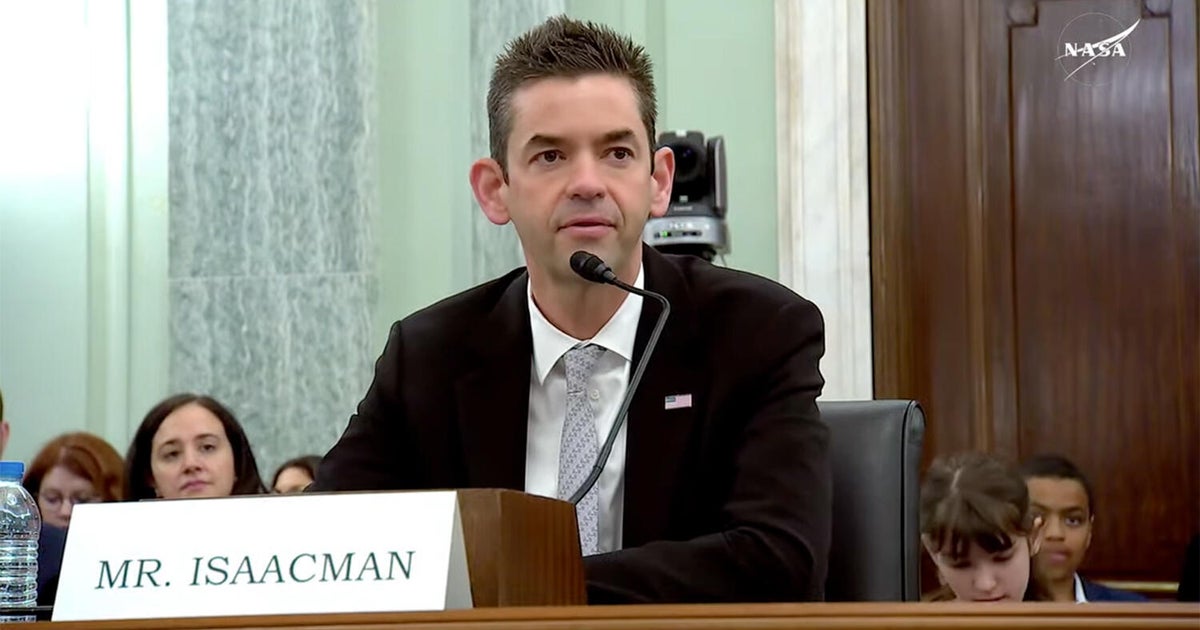Billionaire entrepreneur and space traveler Jared Isaacman, President Trump’s nominee to serve as NASA’s next administrator, told lawmakers Wednesday he supports sending astronauts back to the moon in the Artemis program but plans to “prioritize” eventual trips to Mars.
Sen. Ted Cruz (R-Texas) chaired Isaacman’s confirmation hearing before the Senate Committee on Commerce, Science and Transportation, directly asking the nominee if he would “maintain course with the Artemis program so that we can return American astronauts to the moon before President Trump leaves office?”
“I couldn’t agree more with the president and his inspiring and ambitious goal to send American astronauts to plant the stars and stripes on Mars,” Isaacman said. “He didn’t say we shouldn’t go to the moon.
“I suspect the president, as I feel and probably a lot of Americans (are), is wondering what’s taking us so long to get back to the moon, and why does it cost so much money?”
Along with the president’s call to eventually send astronauts to Mars, senior advisor Elon Musk, the founder of SpaceX, has called NASA’s Artemis moon program a “distraction” and “jobs-maximizing program, not a results-maximizing program.”
The Artemis program, with contractors spread across dozens of congressional districts, is behind schedule and billions of dollars over budget.
But it has strong bipartisan support in Washington and there has been pushback from lawmakers over Musk’s comments and the possibility of major changes that could scale back Artemis, resulting in China beating the United States back to the moon.
Isaacman tried to ease those concerns.
“I absolutely want to see us return to the moon,” he said. “As I mentioned in my prepared remarks, determine the economic, scientific, and national security value while we are also proceeding towards Mars.
“I don’t think we have to make any tough trades here, Senator. I think if we can concentrate our resources at the world’s greatest space agency, we don’t have to make a binary decision of moon versus Mars or moon has to come first versus Mars.”
Cruz asked if NASA, given current budget constraints, could realistically support both a return to the moon along with “a full mission to Mars simultaneously.”
“Senator, as I mentioned my prepared remarks, I think we can absolutely do that,” Isaacman said. “We can figure out the space economy in low-Earth orbit. We can run more scientific missions.
“This is the agency that went from sending Alan Shepard on a suborbital mission and eight years later we saw Neil Armstrong and Buzz Aldrin on the surface of the moon. Do I think that we can get back to the moon, chart a course for Mars and do all the other things? Absolutely.”
Sitting in the audience behind Isaacman were the four NASA astronauts scheduled for launch next year on an around-the-moon flight, the second mission in the Artemis program and the first carrying a crew. NASA says the third mission, tentatively planned for mid-2027, will carry two astronauts to the lunar surface, the first in a series of ever more ambitious Artemis flights.
A renaissance man of sorts, Isaacman, 42, dropped out of high school at age 16 to develop what became Shift4 Payments, a company that processes payments for more than 200,000 restaurants and other retail entities. He also is an accomplished aviator, with a degree in aeronautics, owning a fleet of fighter jets used in part to train military pilots.
He paid SpaceX hundreds of millions — the exact cost is not known — to charter two flights aboard SpaceX Crew Dragon spacecraft, the first purely commercial orbital spaceflights featuring non-government, all-civilian crews.
The first flight, Inspiration4, generated more than $250 million as part of a charity drive for St. Jude Children’s Research hospital. During the second flight, Polaris Dawn, he and a SpaceX crewmate became the first private citizens to walk in space.
“Someday in the future, 50, 100 years from now, you’re going to have a lunar base, you’re going to probably have some sort of a Martian colony,” he said before his first spaceflight in 2021. “But you have to start somewhere. And I think when this mission is complete, people are going to look at it and say it was the first time everyday people could go to space.”
Reviewing a Netflix documentary about the Inspiration4 mission, The Guardian called Isaacman “that rarest of beasts – a genuinely personable billionaire.”
Before his nomination to serve as NASA’s next administrator, Isaacman was in the process of planning two additional flights, including the first crewed flight of SpaceX’s gargantuan Super Heavy-Starship rocket. Those plans will be suspended upon confirmation as NASA administrator.
“I am not a typical nominee for this position,” Isaacman said. “I’ve been relatively apolitical. I am not a scientist, I never worked at NASA. I do not think these are weaknesses, in fact I believe President Trump found them to be strengths.
“If confirmed, I will bring all my experience to the greatest adventure in human history, the quest to discover the secrets of the universe.”
Trump announced Isaacman’s nomination in December, saying on his Truth Social platform: “Jared will drive NASA’s mission of discovery and inspiration, paving the way for groundbreaking achievements in Space science, technology and exploration.”
Isaacman’s “passion for space, astronaut experience and dedication to pushing the boundaries of exploration, unlocking the mysteries of the universe and advancing the new space economy, make him ideally suited to lead NASA into a bold new era,” Trump wrote.
Isaacman’s confirmation hearing came at a time of turmoil at NASA as the agency braces for widespread cuts across multiple programs expected from Musk and his Department of Government Efficiency.
The biggest question mark is the fate of NASA’s Artemis moon program, its giant Space Launch System rocket and its Orion crew capsule.
Along with the ongoing International Space Station program, NASA’s primary goal since the first Trump administration has been to send astronauts back to the moon, focusing on the lunar south pole where deposits of ice may be present in permanently shadowed craters.
If ice is present in extractable quantities, future astronauts may be able to process it into water, air and even rocket fuel, vastly lowering the cost of deep space exploration. The Chinese are pursuing their own moon program with plans to land their own “taikonauts” on the lunar surface by 2030.
Bill Nelson, the NASA administrator under President Joe Biden, couched the superpower competition as a new space race, arguing a U.S. presence on the moon was essential to national security and the nation’s leadership on the world stage.
The Artemis program is built around the Boeing-managed SLS rocket, which will propel astronauts in Lockheed Martin-built Orion capsules to the moon. In the initial moon landing, they will descend to the lunar surface aboard a variant of the Starship upper stage.
Even though NASA is paying SpaceX nearly $4 billion to develop the Artemis lunar lander, Musk, in the wake of Trump’s election, has suggested that NASA should bypass the moon and head for Mars.
“The Artemis architecture is extremely inefficient, as it is a jobs-maximizing program, not a results-maximizing program. Something entirely new is needed,” Musk said on X.
But Cruz does not agree. He repeatedly raised the prospect of China beating America back to the moon as a clear challenge to U.S. national security and global leadership.
“If China beats us to the moon, what consequences might America face?” Cruz asked.
“We certainly cannot lose,” Isaacman replied. “If we do not lead the way and we’re following, we may be following forever, the consequence of which could be extraordinary.
“Even if you’re talking about things that have maybe even a low probability, let’s say, for example, on the lunar surface helium-3 becomes a new source of fusion power. It could shift the balance of power here on Earth. I don’t think we can afford to find that out the hard way. … Space is the ultimate high ground. We cannot afford to cede that ground.”
But when pressed, Isaacman would not commit to establishing a permanent presence on the moon, saying more research is needed to determine the scientific value and costs of such a program.
Asked about his past relationship with Musk and whether the SpaceX founder would enjoy any unusual access, Isaacman said “my loyalty is to this nation, the space agency and their world-changing mission.”
“I have to imagine that in the 1960s, Administrator (James) Webb would have taken phone calls and welcomed the input from all the various contractors that were contributing to the endeavor,” he said. “But NASA is the customer. They work for us, not the other way around.”




